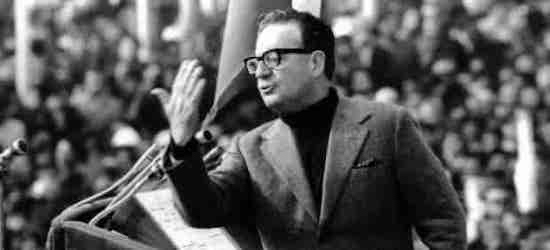Salvador Guillermo Allende Gossens (1908-73, age 65). A Chilean socialist politician who began his career as a was a physician and then moved into politics. He served as the 28th president of Chile from 1970 until his death in 1973. As a democratic socialist committed to democracy, he was the first Marxist to be elected president in a liberal democracy in Latin America.
Allende’s involvement in Chilean politics spanned a period of nearly forty years, during which he held various positions including senator, deputy, and cabinet minister. As a life-long committed member of the Socialist Party of Chile, he unsuccessfully ran for the national presidency three times before winning in a close three-way race.
In office, Allende pursued a policy he called the “Chilean Way to Socialism.” Allende said that he was committed to democracy and represented the more moderate faction of the Socialist Party, while the radical wing sought a more aggressive course.
As president, Allende sought to nationalize major industries, expand education, and improve the living standards of the working class. He clashed with the right-wing parties that controlled Congress and with the judiciary.
On 11 September 1973, the military moved to oust Allende in a coup d’état supported by the CIA, which initially denied the allegations. In 2000, the CIA admitted its role in the 1970 kidnapping of General René Schneider who had refused to use the army to stop Allende’s inauguration.
Declassified documents released in 2023 showed that U.S. president Richard Nixon, his national security advisor Henry Kissinger, and the U.S. government, which had branded Allende as a ‘dangerous Communist,’ were aware of the military’s plans to overthrow Allende’s democratically elected government in the days before the coup.
As troops surrounded La Moneda Palace, Allende gave his last speech vowing not to resign. Later that day, Allende died by suicide in his office; the exact circumstances of his death are still disputed although he probably shot himself with a gun gifted by Fidel Castro.
Allende had said he wouldn’t be taken alive even as Pinochet ordered an all-out attack on La Moneda. The palace was bombed by fighter jets and the air thick with tear gas and smoke as the building went up in flames. Allende had ordered his allies to surrender, but he stayed behind at the last minute.
Following Allende’s death, General Augusto Pinochet refused to return authority to a civilian government, and Chile was later ruled by the Government Junta, ending more than four decades of uninterrupted democratic governance, a period known as the Presidential Republic.
The military junta that took over dissolved Congress, suspended the Constitution of 1925, and initiated a program of persecuting alleged dissidents, in which over 3,000 civilians disappeared or were killed. Pinochet’s military dictatorship only ended after the successful internationally backed 1989 Constitutional Referendum led to the peaceful Chilean transition to democracy.
